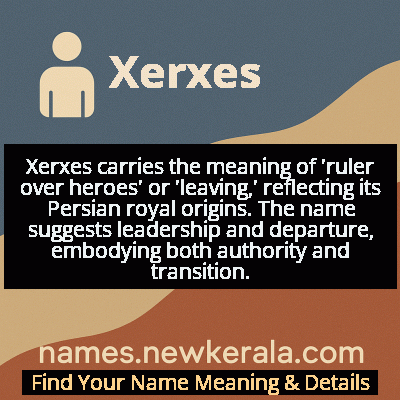Xerxes Name Meaning & Details
Origin, Popularity, Numerology Analysis & Name Meaning of Xerxes
Discover the origin, meaning, and cultural significance of the name XERXES. Delve into its historical roots and explore the lasting impact it has had on communities and traditions.
Name
Xerxes
Gender
Male
Origin
Greek
Lucky Number
5
Meaning of the Name - Xerxes
Xerxes carries the meaning of 'ruler over heroes' or 'leaving,' reflecting its Persian royal origins. The name suggests leadership and departure, embodying both authority and transition.
Xerxes - Complete Numerology Analysis
Your Numerology Number
Based on Pythagorean Numerology System
Ruling Planet
Mercury
Positive Nature
Adventurous, dynamic, curious, and social.
Negative Traits
Restless, impatient, inconsistent, prone to indulgence.
Lucky Colours
Green, white.
Lucky Days
Wednesday.
Lucky Stones
Emerald.
Harmony Numbers
1, 3, 9.
Best Suited Professions
Sales, marketing, travel, entertainment.
What People Like About You
Versatility, charisma, adventurous spirit.
Famous People Named Xerxes
Xerxes I
Persian King
Led the massive Persian invasion of Greece and oversaw major construction projects including the completion of Persepolis
Xerxes II
Persian King
Brief successor to Artaxerxes I, his short reign ended in assassination after just 45 days
Xerxes of Armenia
Armenian King
Ruled the kingdom of Sophene and resisted Seleucid domination in the 2nd century BCE
Name Variations & International Equivalents
Click on blue names to explore their detailed meanings. Gray names with will be available soon.
Cultural & Historical Significance
In modern times, the name has been reinterpreted through various cultural lenses, including its appearance in the Biblical Book of Esther as Ahasuerus, where the Persian king plays a crucial role in the story of Jewish salvation. The name continues to evoke images of ancient power, imperial grandeur, and the complex relationship between Persia and the classical world. Its enduring presence in literature, film, and popular culture ensures that Xerxes remains a recognizable figure representing both historical significance and mythological grandeur.
Extended Personality Analysis
Individuals named Xerxes are often perceived as possessing strong leadership qualities, ambition, and a commanding presence. The historical associations with Persian royalty suggest traits of authority, strategic thinking, and the ability to manage large-scale projects or organizations. There's an expectation of confidence and determination, reflecting the historical Xerxes' massive military campaigns and architectural achievements. The name carries connotations of someone who thinks big and isn't afraid to pursue ambitious goals, though this can sometimes be interpreted as arrogance or overreach.
Beyond the imperial associations, the name suggests complexity and depth of character. The historical Xerxes was known for both his military campaigns and his cultural contributions, indicating a multifaceted personality capable of both conquest and creation. Modern bearers of the name might be expected to demonstrate resilience in the face of challenges and the ability to learn from setbacks, mirroring the historical figure's experiences in the Greco-Persian Wars. The name implies someone with a strong sense of destiny and the courage to pursue their vision, regardless of obstacles.
Modern Usage & Popularity
In contemporary times, Xerxes remains a rare but distinctive name choice, primarily used by parents seeking a name with historical gravitas and unique character. Its usage is most common among families with Persian heritage or those fascinated by ancient history. The name saw a slight resurgence following the release of the film '300' in 2006, though it remains outside the top 1000 names in most Western countries. Modern usage often reflects an appreciation for classical history and a desire to bestow a name that conveys strength and individuality. While still unconventional, it's occasionally chosen by parents looking for a powerful, historically significant name that stands out from more common classical names.
Symbolic & Spiritual Meanings
Symbolically, Xerxes represents imperial power, ambition, and the tension between East and West. The name evokes images of vast empires, monumental architecture, and the clash of civilizations. It symbolizes both the heights of human achievement and the dangers of overreach, reflecting the historical Xerxes' successful expansion of the Persian Empire followed by his defeat in Greece. The name carries connotations of transformation—from mortal ruler to near-divine figure in some representations—and the complex relationship between power and vulnerability. In a broader sense, Xerxes symbolizes the eternal human drive for greatness and the consequences of ambition, serving as a reminder that even the mightiest empires and rulers face limitations and must navigate the delicate balance between aspiration and reality.

